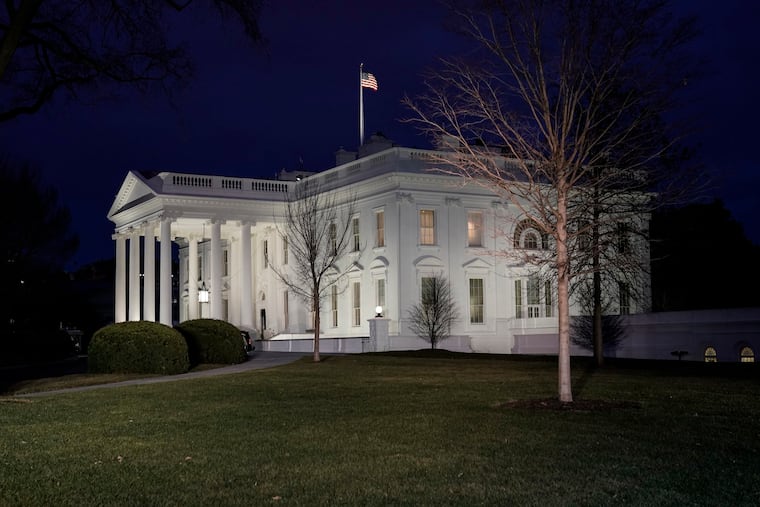A Philly law firm partner agrees to leave his job after taking part in Trump’s Georgia call
What was a lawyer for Philadelphia-based Fox Rothschild doing on President Trump's controversial call pushing Georgia state officials to find extra votes?

A lawyer with the Philadelphia firm of Fox Rothschild has quit the firm after it became public that he joined President Donald Trump’s controversial Jan. 2 call in which Trump begged Georgia election officials to find him 11,780 votes to overturn the presidential election result there.
The lawyer, Alex B. Kaufman, and his father, Robert J. Kaufman, both have departed Fox Rothschild “to pursue new professional opportunities,” the firm said Thursday night. They had joined Fox in its Atlanta officer after dissolving their own firm two years ago.
The Kaufmans left after Fox Rothschild confirmed it had a policy preventing its lawyers from working on the effort to reverse the outcome of the election.
“Firm policy prohibits Fox Rothschild attorneys from representing as counsel anyone participating in efforts to contest the 2020 presidential election,” the firm said.
Alex Kaufman, a politically connected lawyer who was a partner in Fox Rothschild’s Atlanta office, did not respond to calls and messages seeking comment.
Trump’s hour-long call with Georgia officials stirred a fierce public debate after the Washington Post made public a transcript of the encounter. Critics said that Trump acted improperly — some said, even criminally — in cajoling and seeming to threaten the Georgia officials over the election results.
Kaufman’s presence on the call was first reported Thursday morning by an online legal news site, Above the Law. Fox Rothschild told the site that, generally, the firm “does not bar its lawyers from running for public office or participating as individuals in political activities.”
The firm also said that:
“Neither Alex Kaufman nor Fox Rothschild represent the president or his campaign.”
Although Kaufman was on the Jan. 2 call with Trump, he was not there “in his capacity as a Fox Rothschild attorney.”
“Kaufman did not speak” while on the call.
Participation in the call has already proven a headache for the corporate lawyer from Washington who took part, Cleta Mitchell, then a partner at the Foley & Lardner firm. She resigned following news reports that her firm was concerned about her participation and was investigating the matter.
In all, Trump was joined by four supporters on the call, including Kaufman, who was cited by first name only. The others were Trump chief of staff Mark Meadows, Mitchell, and Kurt Hilbert, a Georgia lawyer.
On the other side of the call were the Georgia secretary of state, Brad Raffensperger; the deputy secretary, Jordan Fuchs; and the counsel for Raffensperger’s agency, Ryan Germany.
At the start of the call, Meadows introduced the participants. He introduced Kaufman only by his first name, calling him one of the “attorneys that represent the president.”
Kaufman was previously a lawyer in the executive counsel office of Republican Georgia Governor Sonny Perdue, whose cousin U.S. Sen. David Perdue (R., Ga.) was defeated in Tuesday’s runoff election for a U.S. Senate seat.
Kaufman has a history of public service: He worked as a Georgia prosecutor, and for Congress and the State Department.
In its statement to Above the Law, Fox Rothschild added that Kaufman had served as general counsel of the Republican Party of Fulton County, which includes the city of Atlanta, and also represented the Georgia state GOP.
A spokesman for Trump referred calls to campaign officials, who didn’t respond to messages seeking comment.
Lawyers typically have to clear political work with their firms, which risk being held responsible for their advice and actions if they face legal challenges, as well as any risk to their reputations.
“We don’t permit lawyers to moonlight,” said Lawrence McMichael, chairman at the Dilworth Paxson firm in Philadelphia. “If someone served as counsel to a political party or candidate, it would have to be approved by the firm, and we as a firm would represent them.”
But firms all have their own policies, and they vary, he added.